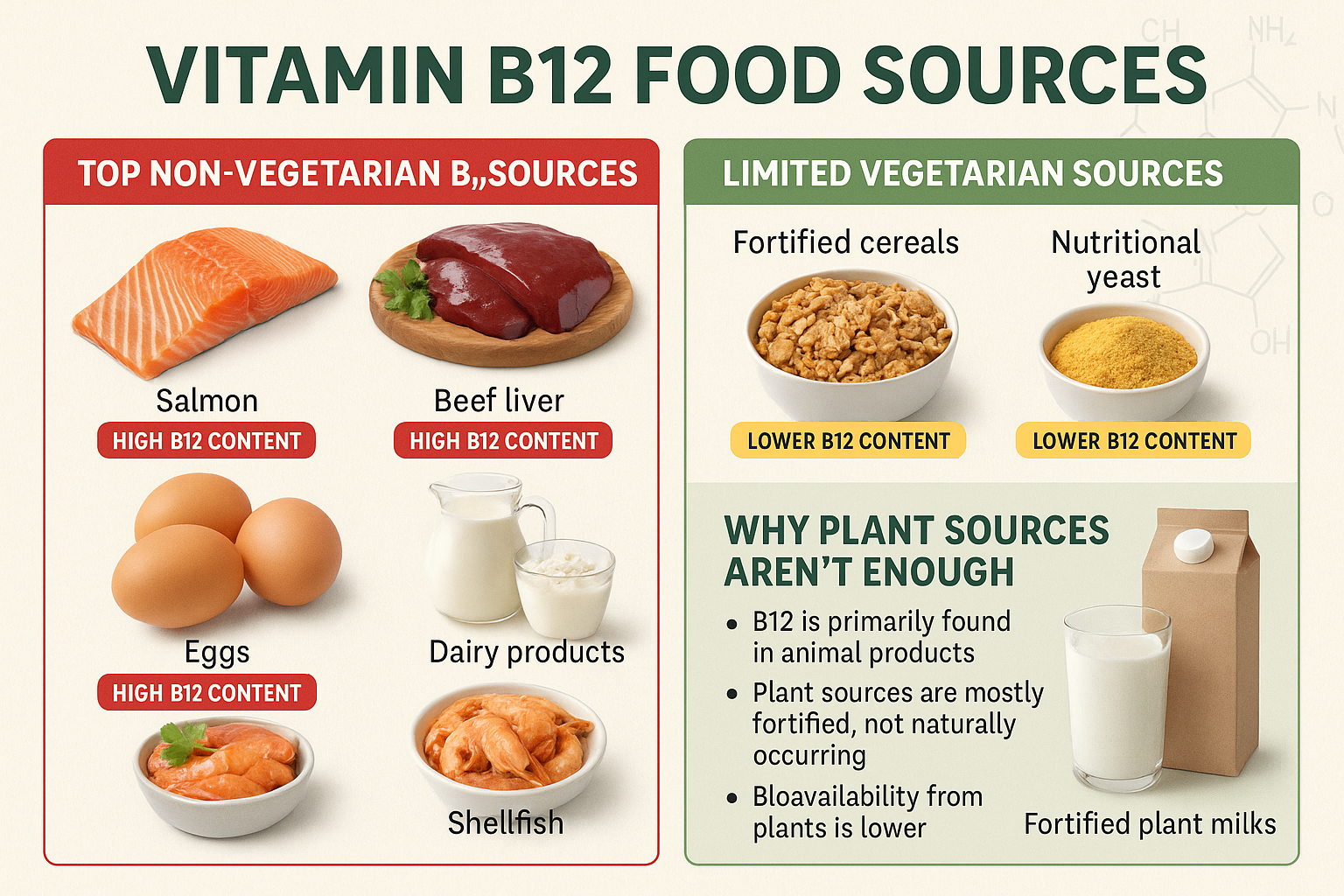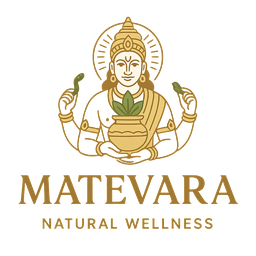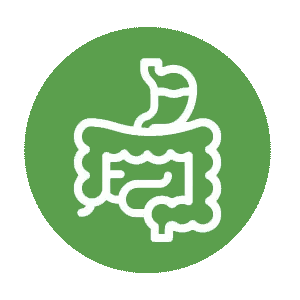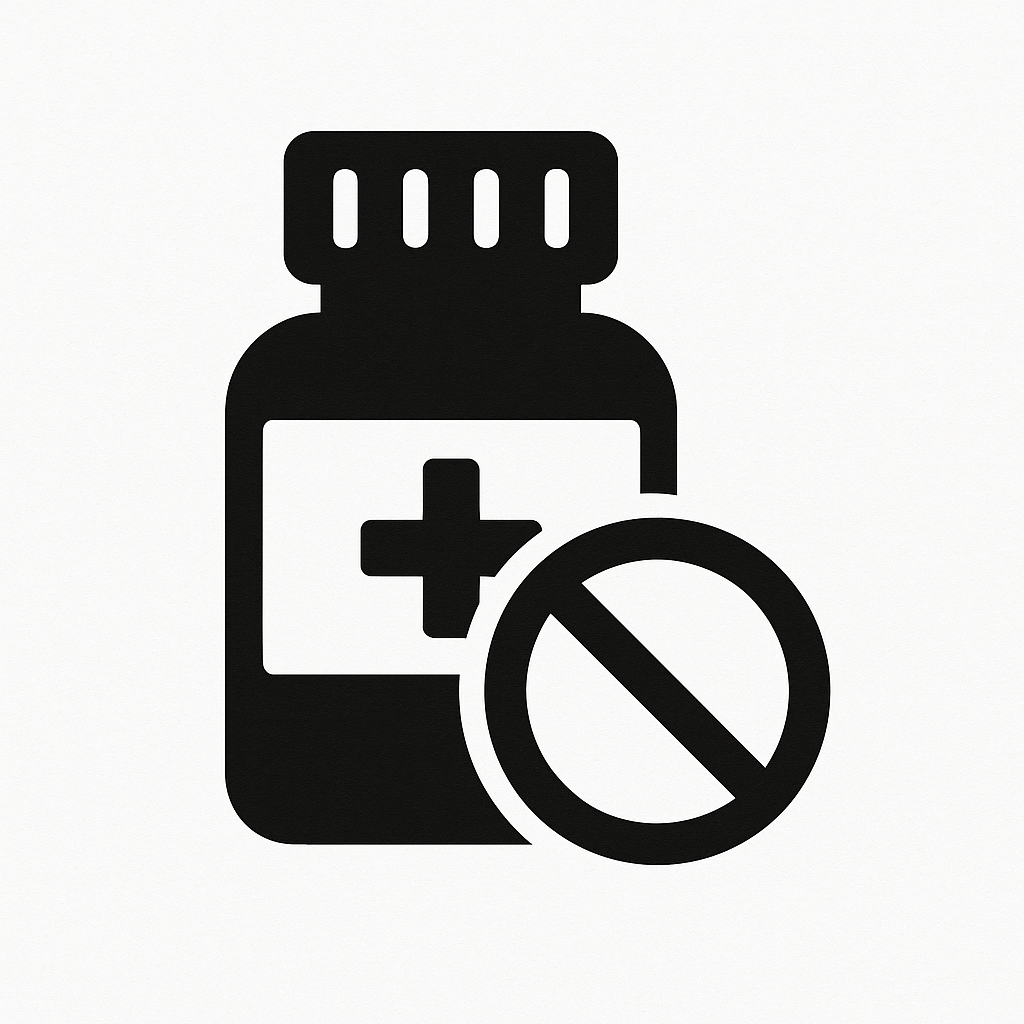
Top Vitamin B12 Foods (Veg & Non-Veg Sources): Why Plant Sources Aren’t Enough?
The Silent Deficiency Affecting Millions
Vitamin B12 deficiency represents one of the most common yet overlooked nutritional deficits worldwide, affecting an estimated 40% of Americans to some degree. Despite its critical importance for nerve function, DNA synthesis, red blood cell formation, and brain health, this essential nutrient remains chronically under-consumed, particularly among certain populations.
What makes B12 deficiency particularly insidious is its slow progression. Unlike some nutrient deficiencies that cause immediate symptoms, B12 depletion can take years to manifest, with the body drawing on liver stores that mask declining status. By the time symptoms appear—fatigue, cognitive impairment, numbness, mood changes—significant damage may have already occurred, some of which may be irreversible.
The challenge intensifies for vegetarians and vegans, as Vitamin B12 exists naturally only in animal-derived foods and certain bacteria. While plant-based diets offer numerous health benefits, they create inherent risk for B12 deficiency unless carefully managed through fortified foods or supplementation.
This comprehensive guide explores the top Vitamin B12 food sources across both vegetarian and non-vegetarian categories, examines why plant sources prove insufficient for meeting B12 needs, and provides evidence-based strategies for ensuring optimal B12 status regardless of dietary pattern.
Understanding Vitamin B12: The Essential Nutrient
Vitamin B12, also called cobalamin due to its cobalt content, is a water-soluble vitamin with extraordinary complexity. It's the largest and most structurally intricate vitamin, requiring sophisticated absorption mechanisms that can fail at multiple points.
The Critical Roles of B12
Neurological Function: B12 is essential for myelin synthesis—the protective coating around nerves that enables rapid signal transmission. Deficiency causes demyelination, leading to numbness, tingling, balance problems, and cognitive decline.
Red Blood Cell Formation: B12 is required for proper red blood cell maturation. Without adequate B12, cells become abnormally large (megaloblastic anemia), reducing oxygen-carrying capacity and causing fatigue.
DNA Synthesis: Every cell division requires B12 for proper DNA replication. This is particularly critical for rapidly dividing cells like those in bone marrow and the digestive tract.
Homocysteine Metabolism: B12 helps convert homocysteine to methionine. Without sufficient B12, homocysteine accumulates, potentially increasing cardiovascular disease risk.
Mental Health: B12 influences neurotransmitter production and function, affecting mood, memory, and cognitive performance. Deficiency is associated with depression, dementia, and cognitive decline.
The Recommended Intake
The recommended dietary allowance (RDA) for adults is 2.4 micrograms (mcg) daily, increasing to 2.6 mcg during pregnancy and 2.8 mcg during lactation. However, many experts suggest that optimal intake may be higher, particularly for older adults whose absorption efficiency declines with age.
The Absorption Challenge: Why B12 is Uniquely Complex
Understanding why B12 deficiency is so common requires examining its complex absorption process, which can fail at multiple stages:
Stomach Acid Requirement: B12 from food is bound to proteins. Strong stomach acid is required to cleave B12 from these proteins. Conditions reducing stomach acid—including aging, antacid medications, and certain autoimmune conditions—impair this first critical step.
Intrinsic Factor Necessity: Once freed from food proteins, B12 must bind to intrinsic factor, a protein produced by stomach parietal cells. Without intrinsic factor, B12 cannot be absorbed. Pernicious anemia, an autoimmune condition affecting up to 2% of people, destroys the cells producing intrinsic factor, making B12 absorption impossible regardless of dietary intake.
Intestinal Absorption Site: The B12-intrinsic factor complex travels to the ileum (final portion of small intestine), where specialized receptors facilitate absorption. Diseases affecting the ileum, including Crohn's disease, celiac disease, and surgical removal, prevent B12 absorption.
Medication Interference: Metformin (diabetes drug), proton pump inhibitors (acid reflux medication), and H2 blockers all interfere with B12 absorption through various mechanisms.
This multi-step process explains why dietary intake alone doesn't guarantee adequate B12 status. Even with sufficient intake, absorption problems can create functional deficiency.
Top Non-Vegetarian Vitamin B12 Sources
Animal-derived foods contain B12 because animals either consume bacteria that produce B12 or consume other animals that have accumulated B12. These foods provide the most bioavailable, easily absorbed forms of the vitamin.
Shellfish: The B12 Champions
Clams rank as the absolute richest dietary source of Vitamin B12, with a remarkable 84 micrograms per 3-ounce serving—that's 3,500% of the daily value. Just a few clams provide more than a week's worth of B12.
Oysters deliver approximately 16 mcg per 3-ounce serving (670% DV), along with exceptional zinc content that supports immune function.
Mussels provide about 20 mcg per 3-ounce serving (835% DV), offering one of the most concentrated B12 sources available.
These shellfish also provide high-quality protein, omega-3 fatty acids, iron, and selenium, making them nutritional powerhouses beyond their B12 content.
Practical Application: Incorporate shellfish weekly if you consume animal products. Canned clams offer affordable convenience while retaining B12 content. Add them to pasta, chowders, or seafood dishes.
Fish: Excellent B12 Providers
Salmon contains approximately 4.8 mcg of B12 per 3-ounce serving (200% DV), along with heart-healthy omega-3 fatty acids and high-quality protein. Wild-caught varieties generally contain more B12 than farmed.
Tuna provides about 2.5 mcg per 3-ounce serving (104% DV). Both fresh and canned tuna retain B12, making this an accessible, affordable option.
Trout delivers approximately 5.4 mcg per 3-ounce serving (225% DV), rivaling salmon in B12 content.
Sardines offer about 8.2 mcg per 3.75-ounce can (342% DV), plus the bones (in canned varieties) provide exceptional calcium.
Fish provide the additional benefit of being among the few dietary sources of Vitamin D, another commonly deficient nutrient, making them doubly valuable for nutritional optimization.
Practical Application: Aim for 2-3 servings of fatty fish weekly for both B12 and omega-3 fatty acids. Canned options provide convenience and affordability while preserving nutritional value.
Meat: Reliable B12 Sources
Beef liver contains an extraordinary 70 mcg per 3-ounce serving (2,917% DV), making it among the most concentrated sources of multiple nutrients including B12, Vitamin A, iron, and folate. However, its strong flavor limits regular consumption for many people.
Beef (various cuts) provides 1.5-2.4 mcg per 3-ounce serving (60-100% DV). Grass-fed beef generally contains more B12 than grain-fed varieties.
Lamb offers approximately 2.7 mcg per 3-ounce serving (113% DV), along with high-quality protein and minerals.
Pork contains about 0.6 mcg per 3-ounce serving (25% DV), lower than red meat but still a meaningful contributor when consumed regularly.
Chicken and Turkey provide modest B12, with approximately 0.3-0.4 mcg per 3-ounce serving (13-17% DV). While not rich sources, poultry consumed regularly contributes to total B12 intake.
Practical Application: Including lean red meat 2-3 times weekly provides substantial B12 alongside other nutrients like iron and zinc. Organ meats, despite their nutritional density, require acquired taste that limits widespread consumption.
Dairy Products: Accessible B12 Sources
Milk provides approximately 1.2 mcg per cup (50% DV), making it a significant B12 contributor for those who consume dairy regularly.
Yogurt contains about 1.1 mcg per cup (46% DV), with the added benefit of probiotics supporting digestive health and potentially improving nutrient absorption.
Cheese varies by type, with Swiss cheese providing approximately 0.9 mcg per ounce (38% DV), while cheddar offers about 0.2 mcg per ounce (8% DV).
Cottage Cheese delivers roughly 1.0 mcg per cup (42% DV), along with high protein content that supports satiety.
Dairy products offer the advantage of being consumed regularly in many dietary patterns, providing consistent B12 intake across multiple daily servings.
Practical Application: If you consume dairy, include 2-3 servings daily to contribute meaningfully to B12 intake. Choose low-fat or non-fat varieties to minimize saturated fat while retaining B12 and other nutrients.
Eggs: The Vegetarian-Friendly Animal Source
Whole eggs contain approximately 0.6 mcg of B12 per large egg (25% DV), with B12 concentrated in the yolk. Eggs provide complete protein and numerous other nutrients including choline, selenium, and Vitamin D.
While not as B12-rich as shellfish or organ meats, eggs represent an accessible, versatile option consumed regularly by many people, making them a consistent B12 contributor.
Practical Application: Include eggs regularly as breakfast items, hard-boiled snacks, or additions to salads and grain bowls. Remember that B12 is in the yolk, so egg-white-only options don't provide this nutrient.
Vegetarian Sources: The Limitations Revealed
This is where the discussion becomes critical for plant-based eaters. The stark reality is that naturally occurring Vitamin B12 is found only in animal products and certain bacteria—not in plants.
Why Plants Don't Contain B12
B12 is synthesized exclusively by certain bacteria and archaea. Animals obtain B12 by consuming bacteria directly (through fermented gut contents or contaminated vegetation) or by consuming other animals that have accumulated B12. Plants don't require, produce, or accumulate B12, so they don't contain meaningful amounts.
Some sources claim certain plant foods contain B12:
Unwashed organic vegetables: While vegetables contaminated with B12-producing bacteria might contain traces, the amounts are insignificant and inconsistent. Relying on this is nutritionally irresponsible.
Seaweed and algae: Certain varieties like nori and chlorella contain B12-like compounds (analogs), but research suggests these are predominantly inactive forms that don't function as B12 in human metabolism. Some studies even suggest these analogs may interfere with absorption of true B12.
Spirulina: Often marketed as a B12 source, spirulina contains primarily inactive B12 analogs that don't address deficiency and may actually worsen it by blocking active B12 absorption.
Fermented foods: Tempeh, miso, and other fermented products sometimes contain trace B12 from bacterial fermentation, but amounts are minimal, highly variable, and unreliable for meeting nutritional needs.
Fortified Foods: The Vegetarian Solution
The only reliable plant-based B12 sources are fortified foods—products with B12 added during manufacturing:
Fortified Plant Milks: Many almond, soy, oat, and other plant milks are fortified with B12, typically providing 1.1-1.5 mcg per cup (45-60% DV). Check labels, as not all brands fortify their products.
Fortified Breakfast Cereals: Many cereals contain added B12, with amounts ranging from 1.5-6 mcg per serving (60-250% DV). Again, label verification is essential.
Fortified Nutritional Yeast: Popular among vegans for its cheesy flavor, fortified nutritional yeast provides approximately 2.4 mcg per tablespoon (100% DV). Critical note: Only fortified varieties contain B12; unfortified nutritional yeast contains none.
Fortified Meat Alternatives: Some veggie burgers, plant-based "meats," and other alternatives contain added B12, though amounts vary widely by brand and product.
Practical Application: Vegetarians and vegans must either consume fortified foods consistently throughout the day (since B12 absorption is more efficient with smaller, frequent doses) or supplement. Reading labels is non-negotiable, as fortification is not universal even within product categories.
Why Supplementation Becomes Essential
Given the limitations of plant sources and the complexity of B12 absorption, supplementation represents the most reliable strategy for ensuring adequate B12 status, particularly for:
Vegans and Vegetarians: Without animal products, achieving adequate B12 from diet alone requires meticulous attention to fortified foods. Supplementation provides insurance against deficiency.
Adults Over 50: Stomach acid production declines with age, impairing B12 liberation from food proteins. The Institute of Medicine recommends that adults over 50 obtain B12 primarily from fortified foods or supplements.
People Taking Certain Medications: Metformin, proton pump inhibitors, and H2 blockers all interfere with B12 absorption, necessitating supplementation.
Individuals with Absorption Issues: Conditions including pernicious anemia, celiac disease, Crohn's disease, and gastric surgery make dietary B12 inadequate regardless of intake.
Pregnant and Lactating Women: Increased needs during pregnancy and lactation, combined with the critical importance of B12 for fetal and infant neurological development, make supplementation advisable for those not consuming substantial animal products.
B12 Supplement Forms
Cyanocobalamin: The most common and studied form, stable and inexpensive. The body converts it to active forms. Despite containing a cyanide molecule, the amount is negligible and considered safe.
Methylcobalamin: An active form that doesn't require conversion, often marketed as superior. While it may benefit certain individuals with genetic variations affecting B12 metabolism, research doesn't definitively prove superiority for general population.
Hydroxocobalamin: Another active form, often used in injections. Less common in oral supplements but effective.
Adenosylcobalamin: An active form involved in energy metabolism, sometimes combined with methylcobalamin in supplements.
Dosing Considerations
B12 absorption decreases as dose increases. The body can absorb only about 1.5-2 mcg at a time through the intrinsic factor mechanism, but passive diffusion allows absorption of approximately 1% of higher doses.
For supplementation:
- Daily doses: 25-100 mcg (the excess compensates for inefficient absorption)
- Weekly doses: 1000 mcg once or twice weekly
- For deficiency treatment: Higher therapeutic doses (1000-2000 mcg daily) until levels normalize
Blood testing (serum B12 or more sensitive tests like methylmalonic acid and homocysteine) helps determine appropriate dosing and monitors repletion effectiveness.
Signs and Consequences of B12 Deficiency
Recognizing deficiency early allows intervention before irreversible damage occurs:
Early Signs:
- Unusual fatigue and weakness
- Lightheadedness or dizziness
- Pale or jaundiced skin
- Difficulty concentrating or brain fog
- Mood changes, irritability
Progressive Symptoms:
- Numbness or tingling in hands and feet (peripheral neuropathy)
- Balance problems and difficulty walking
- Memory problems and cognitive decline
- Glossitis (inflamed, smooth tongue)
- Mouth ulcers
- Vision changes
Severe/Long-term Consequences:
- Irreversible neurological damage
- Megaloblastic anemia
- Increased homocysteine (cardiovascular risk)
- Depression and psychiatric symptoms
- Dementia-like cognitive impairment
Infants born to B12-deficient mothers face serious risks including developmental delays, failure to thrive, movement disorders, and permanent neurological damage. This makes B12 adequacy during pregnancy absolutely critical.
Optimizing B12 Absorption and Status
Beyond simply consuming B12, several strategies optimize absorption and utilization:
Spread Intake Throughout Day: Since absorption mechanisms handle only small amounts at once, consuming B12 across multiple meals improves total absorption compared to one large dose.
Address Absorption Barriers: If taking medications that interfere with B12 absorption, discuss supplementation strategies with healthcare providers. Consider timing supplements away from medications when possible.
Monitor Status: Periodic blood testing, especially for at-risk populations, ensures supplementation strategies are effective. Standard serum B12 tests may miss functional deficiency; methylmalonic acid and homocysteine provide more sensitive assessment.
Support Overall Digestive Health: Healthy gut function optimizes all nutrient absorption. Consider digestive support strategies including probiotics, adequate hydration, and stress management.
Combine with Folate: B12 and folate work together in several metabolic pathways. Adequate folate intake (from leafy greens, legumes, fortified grains, or supplements) supports B12 function.
Avoid Excessive Alcohol: Alcohol interferes with B12 absorption and utilization. Moderate consumption and avoid excessive intake.
Special Considerations for Vegetarians and Vegans
Those following plant-based diets face unique B12 challenges requiring proactive management:
Supplementation is Non-Negotiable: Without reliable animal product consumption, supplements or consistently consumed fortified foods are essential, not optional.
Higher Doses May Be Needed: Some research suggests vegans may require higher supplemental doses to maintain optimal status, possibly due to differences in gut microbiome composition.
Don't Rely on Unreliable Sources: Resist claims that nutritional yeast (unless fortified), spirulina, or seaweed provide adequate B12. These are not dependable sources.
Monitor During Life Stages: Pregnancy, lactation, and periods of increased stress or illness increase B12 needs. More frequent monitoring and potentially higher supplementation may be necessary.
Consider Sublingual or Injection Forms: For those with absorption issues, sublingual B12 (dissolves under tongue, bypassing some digestive requirements) or injections (completely bypass digestive absorption) may be more effective than oral tablets.
The Ethical and Health Intersection
For many vegetarians and vegans, dietary choices stem from ethical, environmental, or religious convictions that are deeply held and valuable. Recognizing B12's unique status—required for health but not naturally available from plants—represents a biological reality that doesn't diminish the validity of plant-based dietary patterns.
Modern supplementation technology allows adherence to plant-based ethics while maintaining optimal health. B12 supplements are typically synthesized through bacterial fermentation, not derived from animals, making them acceptable to most vegans.
The key is approaching B12 status with the seriousness it deserves, recognizing that nutritional adequacy is foundational to pursuing other life goals, ethical commitments, and personal well-being.
Take Control of Your B12 Status
Vitamin B12 represents one of the few nutrients where supplementation is truly necessary for large segments of the population. Whether you consume animal products but face absorption challenges, follow a plant-based diet, or simply want to optimize your nutritional status, ensuring adequate B12 is foundational to neurological health, energy, cognitive function, and overall well-being.
Don't wait for deficiency symptoms to appear—by that time, significant depletion has already occurred. Proactive supplementation, strategic food choices, and periodic monitoring ensure you maintain optimal B12 status throughout life.
For high-quality Vitamin B12 supplements and comprehensive vitamin formulations designed to support optimal nutritional status, explore the collection at https://matevara.com/collections/vitamins. These carefully formulated products provide bioavailable B12 forms in appropriate doses to support your health, regardless of dietary pattern.
Your nervous system, blood cells, DNA, and brain depend on adequate B12. Make this critical nutrient a priority in your wellness strategy.
Disclaimer: The information provided in this article is for educational and informational purposes only and is not intended as medical advice, diagnosis, or treatment. Vitamin B12 supplementation and the management of B12 deficiency should be undertaken with appropriate medical supervision, particularly for individuals with diagnosed deficiency, absorption disorders, or underlying health conditions. This article does not constitute professional medical or nutritional advice and should not replace consultation with qualified healthcare providers, registered dietitians, or other appropriate medical professionals. B12 deficiency can cause serious, potentially irreversible neurological damage if left untreated, making proper medical evaluation and monitoring essential. Self-diagnosis and self-treatment of B12 deficiency based on symptoms described in this article is not recommended—blood testing is necessary for accurate diagnosis. The B12 content of foods listed represents approximate values that can vary based on factors including food source, preparation methods, and individual product formulations. Individuals with pernicious anemia, inflammatory bowel disease, celiac disease, or those who have had gastric surgery require specialized B12 supplementation approaches developed with healthcare providers. Pregnant and lactating women should consult their healthcare providers regarding appropriate B12 supplementation to ensure adequate maternal and fetal/infant status. Some medications interact with B12 or affect its absorption, necessitating medical guidance for appropriate supplementation strategies. Vegetarians and vegans, particularly those pregnant or nursing, should work with knowledgeable healthcare providers to ensure adequate B12 status through appropriate supplementation and monitoring. While B12 has low toxicity, extremely high doses should only be taken under medical supervision for treatment of diagnosed deficiency. The statements made about B12 have not been evaluated by the Food and Drug Administration. Always inform all your healthcare providers about supplements you are taking to ensure safe, coordinated care tailored to your individual health needs and circumstances.
Share








